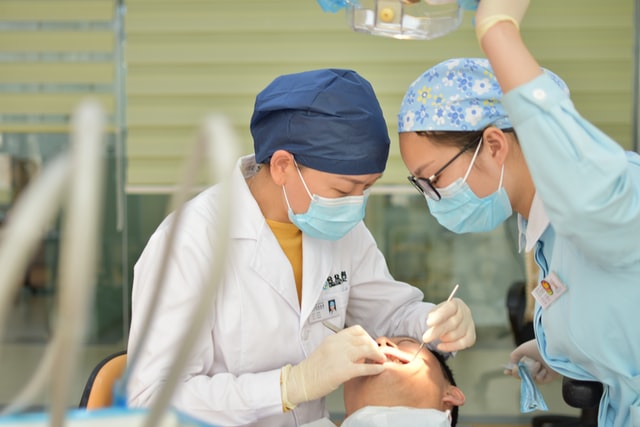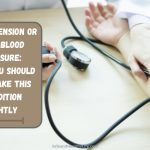
A tooth abscess is a condition you should treat as soon as possible – so first call an emergency dentist for prompt dental care in West Loop.
Don’t try to deal with the abscess on your own – not even with medication.
In fact, one of the most common questions we get is, “Will a tooth abscess go away with antibiotics?” But as you will see in this article, the answer is no.
What Is a Tooth Abscess?
When the levels of bacteria in your mouth grow too high, your teeth may start decaying. Eventually, a pocket of pus may form in your tooth, on the gums, or even the bone leading to the tooth.
This pocket is a dental abscess – a painful, sometimes dangerous condition that needs treatment as soon as possible.
Keep in mind that you can’t and shouldn’t try to treat an abscess on your own. Ointments and painkillers are only temporary solutions – the abscess never goes away without proper treatment.
Instead, as soon as you notice some changes in your teeth or gums, seek help from an emergency dentist.
Dental Abscess Symptoms
It’s essential to act fast before the infection spreads or grows more severe. But to do that, you need to recognize the signs of abscess early on.
And here are some of the common ones:
- Throbbing pain in the affected area that gradually gets worse
- Pain that may wake you up as it worsens when you lie down
- An ache that spreads to your jaw, neck, and ear on the side where the tooth is
- Swelling and redness in the face
- Red, shiny, swollen gums
- Sensitivity to hot or cold food and drinks
- A discolored or loose tooth
- An unpleasant taste in the mouth or bad breath
If the abscess gets worse, you could even develop a fever and feel general weakness. In the worst cases, the infection can spread to your jaw or even the brain.
Obviously, you don’t want it to get to that point, so you must regularly visit your dentist. And if you do notice any of the more severe symptoms, get same-day emergency dental services.
Tooth Abscess Treatment

Photo Credit: Unsplash
Typically, the only way to treat a dental abscess is to remove the infection source and drain the pus.
In some more extreme cases, your dentist might have to extract your whole tooth. But usually, if it comes to that, the tooth is too far gone already and would do you no good as is.
There are two common procedures that your dentist might perform when you have a dental abscess. Those include:
- Incision and draining. Your dentist will make a small cut on your gums to drain the abscess and wash the area with saltwater. Afterward, they might put a small drain to keep the incision open as the swelling decreases.
- Root canal. Your dentist will drill into your tooth in order to eliminate the infection at the root. They will remove the diseased tissue, drain the abscess, and then fill the tooth and seal it. If the job is done well, you shouldn’t experience any problems.
After these procedures are completed, your dentist might prescribe a round of antibiotics to fight off the infection, especially if it was more severe.
However, in most cases, that won’t be necessary – the procedures alone should take care of the abscess.
Will a Tooth Abscess Go Away With Antibiotics?
In essence, a dental abscess is a bacterial infection. As such, it should be susceptible to antibiotics. Yet we wouldn’t advise you to try and treat it on your own with them, nor would any dentist immediately prescribe them. But why is that the case?
The reason is simple – due to the tooth’s anatomy and the infection’s nature, antibiotics are almost entirely ineffective. Typically, antibiotics travel through the bloodstream to reach infected areas of the body.
However, dental infection often completely destroys the blood vessels that supply the inside of the tooth.
Thus, antibiotics can’t even reach the area that needs their help.
In addition, there are various strains of bacteria that can cause an abscess. If the antibiotics you’re taking don’t directly attack the strain responsible for the infection, they won’t have any effect.
In fact, the overuse of antibiotics when they aren’t needed can be quite harmful – it leads to antibiotic-resistant bacteria strains.
So while antibiotics won’t make the abscess go away, they may be useful in battling the infection once it spreads.
For instance, if your jaw gets infected too, your walk-in dentist might prescribe you around to help fight it along with treatment.
How to Prevent Dental Abscesses
Of course, if you can avoid dealing with abscesses and antibiotics, you definitely should. Even though nothing can guarantee you won’t get an infection, you can still try your best to keep your mouth and teeth healthy.
Here are some of the things that you should do:
- Brush your teeth twice a day. Make sure to keep brushing for at least two minutes and use fluoride toothpaste.
- Use floss. Clean the area between your teeth and under the gums at least once a day.
- Don’t rinse your mouth after brushing your teeth. If you do, you’ll wash away the protective toothpaste layer. Instead, just spit out excess toothpaste.
- Don’t consume sugary or starchy food and fizzy drinks. Or if you can’t help yourself, try to cut down on them. Avoid them in particular between meals or before bed.
- Regularly visit your dentist. That way, you’ll spot issues early and deal with them before they become a dental emergency.
- Replace your toothbrush every few months. As soon as the bristles get frayed, it’s time for a new toothbrush.
- Use a fluoride mouth rinse. It provides another layer of protection against bacteria.
Treat Tooth Abscesses On Time
So, will a tooth abscess go away with antibiotics?
The answer is no, it won’t – at least not if you use them without any other forms of treatment. And instead of guessing what you should do on your own, go and get emergency dental care. Your dentist will take care of your abscess in no time and tell you how to make sure it doesn’t return!
About The Author:
Gilbert D. Curtis, DDS, is an associate professor at the University of Connecticut School of Dental Medicine. He teaches both the undergraduate Doctor of Dental Medicine curriculum and the Advanced Education General Dentistry Residency.




